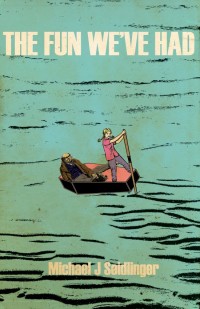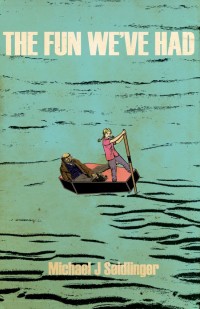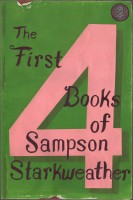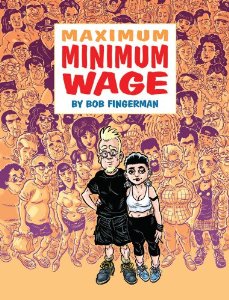25 Points: Mother of a Machine Gun
 |
Mother of a Machine Gun
by Michael J. Seidlinger
Lazy Fascist Press, 2014
100 pages / $7.95 buy from Amazon
|
1. When I first read the title, I pondered the possibility of an automatic weapon being successfully birthed from a woman’s vagina. (Pretty sure your genitalia would never be the same.)
2. The writing style of Mother of a Machine Gun reminded me of some strange Dr. Seuss book I read as a child.
3. Michael J. Seidlinger is a fucked up Dr. Seuss.
4. Kind of wonder if Seidlinger’s mother has read Mother of a Machine Gun and whether or not she thought it should be “critically acclaimed.”
5. Pondered the economic and environmental costs of having so many one-line paragraphs.
6. To go along with point #5, probably should’ve put in pictures or something to fill in the vast amount of white space.
7. To go along with points #5 and #6, the vast amount of white space and one-line paragraphs make for a quick read. (Could be a positive or negative thing depending on whether or not you like the book.)
8. Mother of a Machine Gun is a story of denial.
9. Mother sucks at being a mother.
10. Mother probably shouldn’t be left to go on a crusade to find her son.
September 25th, 2014 / 4:30 pm
25 Points: The Fun We’ve Had
 |
The Fun We’ve Had
by Michael J. Seidlinger
Lazy Fascist Press, 2014
168 pages / $11.95 buy from Amazon
|
1. I want the cover of this book framed and hung up in my room.
2. Recognized and accepted that this novel was going to end in tragedy from the beginning.
3. They either brought a really shitty oar on this terrifying adventure, or that guy doesn’t know how to paddle. (It breaks within the first few pages.)
4. Life lesson from this novel: coffins don’t make good boats. (No shit.)
5. Imagined this book as one of the little “skits” in the film Heavy Metal with “Fade to Black” by Metallic playing in the background.
6. After realizing that Seidlinger was using the five stages of grief as a plot device, I immediately thought of a Robot Chicken skit where a giraffe gets stuck in a sand pit.
7. The Fun We’ve Had is an extreme form of marital counseling.
8. How the hell did these people get into this situation? (This can be taken as both a literal and metaphorical question.)
9. I want to know what ocean these people are sailing through—and don’t tell me it’s the “sea of life” because that’s bullshit and you know it.
10. Seidlinger doesn’t believe in long paragraphs. He wants to jab you with short one-liners that make you question everything.
July 1st, 2014 / 12:00 pm
The Fun We’ve Had
 |
The Fun We’ve Had
by Michael J. Seidlinger
Lazy Fascist Press, 2014
168 pages / $11.95 buy from Amazon
Rating: 7.9
|
How do you write a thrilling and entrancing Alt Lit novel?
Start with a chorus of disembodied voices telling us that “the waves are helloes; the incoming storm the sincerest goodbye. Like every single one of us, they are holding on. We held on until we could no longer hide. No one can hide out at sea.”
June 24th, 2014 / 12:00 pm
In Theory, This Could Be Fun
Airport living from 5/14 thru 5/16 in celebration/mourning of the publication of my latest book, “The Fun We’ve Had.”
Any advice on keeping off of security’s radar? Anyone want a shout-out when I get really fucking bored? Anyone want to Skype while I’m leeching off the airport’s Wi-Fi?
Maybe I’ll just watch that Tom Hanks movie and do exactly what he did. Could be good.
Here’s the blog post I wrote about this, whatever this is:
In a big way, being in an airport is a lot like being lost at sea. So many places and possibilities to drift, but not if you don’t already know where it is that you’re going.
I don’t know where I’m going. That’s why I’m not going anywhere.
I’ll be living in an airport for 48hrs.
Beginning 10AM on Wednesday May 14th through Friday May 16th around 10AM: Going nowhere and probably getting into some shit. There’s a good chance I will no longer be human by the end of it. There’s a pretty damn good chance that I’ve never been human. Not to worry, I’ll be online and active during the entire thing.
Odds are you’ll hear from me, be it a tweet, a post on Facebook, or a photo/video on Instagram. I’ll be calling out to everyone while I’m stranded in a state of flux. I’ll also have one of my best writer friends around, Kyle Muntz, hanging around, surviving this ridiculousness with me.
Yes I’m serious. Look how serious I am:
Will it be fun? I hope so. If not, I’ll be at the airport bar.
\m/ \m/
In Conversation: Matthew Revert and Michael J Seidlinger
Matthew Revert: Who friended who? I don’t even know anymore.
Michael J Seidlinger: How the hell did we start talking to each other? At one point we were both strangers, completely invisible to each other. Hmm, I think what happened, on my end, is that I friended you and didn’t reach out and talk for a long time. I tend to do that.

MR: I remember you were posting about your insomnia, and being a fellow insomniac, we discussed it a lot.
MS: This is true. I am a raging insomniac.
MR: And I suggested you listen to earth2 by Earth. And friendship was born.
MS: And from there, it quickly spiraled into design. I think it was being mutually interested in graphic design that forged it.
MR: Design was the key. I’m not even sure if you knew I was a writer at the time.
MS: I actually did. I knew you were a writer. Ironically, I do remember knowing of you as a writer before the design.
MR: Oh? That actually pleases me.
MS: I think it was the book with all the people on the front, the carbon copies. A Million Versions of Right?
MR: Yeah, that was my first book. About to go out of print actually.
MS: Yeah, I bought that and read it and it wasn’t until we started talking about insomnia via comment threads and Facebook chat that I put the pieces together.
MR: Shortly after meeting you, I started investigating CCM and saw that you were a writer and also a designer. That parallel pleased me because I had always been shoved into the writer camp or the designer camp (increasingly the latter).
MS: Since taking over CCM, I’m setting all my books originally published on CCM out of print; ethical issue.
MR: Yeah. That makes sense. I worried about that with my first books for LegumeMan.
MS: Ah, so CCM led the way? It’s interesting to meet people that knew of the press before they knew of me.
MR: Yeah. Pretty sure it did. And I purchased My Pet Serial Killer. And really enjoyed a lot of your CCM design work.
MS: That gets me to thinking…
MR: Yeah?
MS: How we’re both writers and designers. I do believe that you and I were writing the books at the same time, the books that we’re talking about.
MR: As in, when we first met, you were writing Laughter of Strangers and I was writing Basal Ganglia?
MS: I recall writing Laughter of Strangers around the time you were revising and “going under” and really getting into the thick of it with Basal Ganglia. We were already talking, but it wasn’t until that time that we started talking on a daily basis.
MR: Yeah. We were both working on our books. Did we know, at that time, they would both be released by Lazy Fascist in the same batch?
MS: That’s interesting. I don’t think so. I could be wrong but I do recall having many a late night talking craft.
MR: Yeah. We unloaded our various frustrations and triumphs on each other.
MS: Good days and bad: We discussed them all.

MR: Basal Ganglia was a very difficult book for me to write so there was a lot of ennui. How long did it take you to write Laughter of Strangers? You write much faster than me, I think.
MS: It took me about 3 or 4 weeks.
MR: Hahahaha. Basal took me 18 months and is half the length. You’re a machine.
MS: I think I write fast because I’m afraid of staying with a book for too long. As a result, I become consumed by the project. How many drafts did you have for Basal?
MR: Yeah, and that clearly works for you. I mean the end result says it all. I had upwards of ten false starts. I turn my book into a year-long lifestyle.
MS: So you “live” the novel—that’s awesome. Do you have any specific quotas/rituals?
MR: Getting right down to it, I started writing Basal Ganglia as a response to cognitive therapy I was undergoing. I wanted to understand that experience. That’s how it tends to be for me. I am responding to something that has happened. Something that has led to significant change within me.
MS: From the beginning, the book delved right into the cerebral.
MR: Yeah, I’m in that place. I tend to live the book for long periods. Gradually eking it out.
MS: So you sort of have a period of “making sense of it?”
MR: Yeah. And that period often maintains well into the process, but as a result of that, it only had two drafts. My first draft is very close to the final draft. But Basal Ganglia was a real puzzle to figure out and I wanted to understand as many pieces of that puzzle as possible before I started writing it.
MS: I’m personally interested in the part of the writing process that involves not the initial process, or drafting, but rather how an idea becomes something more organic, something real. It’s interesting to see how you turned the book into a puzzle given how you were looking to make sense of a puzzle. You crafted a puzzle to make sense of a personal puzzle.
MR: It seems to me that so much of the energy in Laughter of Strangers would come from the way you’re able to almost purge the book in a shorter space of time.
MS: I believe I’m beginning to see that, yeah. I have this compulsion to chase after the perceived momentum of a piece. Everything hinges on the first 2 days of writing—that two-day stretch sets the pace. Most of the time, I write approximately 3000-5000 words, have the general structure and feel of the book. I’ll know where it’s going; from there, it begins to consume me. I can’t stop thinking about it. It follows me throughout my days. As a result, I write faster. Maybe it really does show itself in the stuff I write.
MR: Before I started writing Basal Ganglia, I knew I wanted it to be set in the human brain, with the “basal ganglia” of the title becoming the only characters within that brain.
MS: Do you outline, or plan out anything conceptually?
MR: Not on paper, no. I usually start writing a random chapter. I think the first part of Basal I wrote was chapter 7. This sounds kind of wonky, but the only real planning I did outside of my head was to have a print out of the human brain’s anatomy on my writing desk. I circled a part of the brain and said, ‘okay… now write this’.
Michael J Seidlinger’s SUMMER READS
SUMMER READS: Starting today and over the course of the next couple weeks, I’ll be posting some summer reading recommendations by various writers.
I asked the writers to recommend a few books for summer reading, or to talk about some books they’re particularly looking forward to delving into this summer.
First up, some great picks from Michael J Seidlinger:
***
 The First Four Books of Sampson Starkweather by Sampson Starkweather (Birds LLC, 2013)
The First Four Books of Sampson Starkweather by Sampson Starkweather (Birds LLC, 2013)
I only recently discovered this guy’s poetry and I am truly kicking myself for it. His poems weave together humor and pop culture references. The book is 328 pages of I-have-no-idea-what-to-expect but if it’s anything like what I’ve read at Typo Magazine and other journals, there’s a lot of good in this three hundred page book.
And that name. Mannnnnnn… now I’m in the mood for a good film noir. Someone recommend me a good film noir.
 Maximum Minimum Wage by Bob Fingerman (Image Comics, 2013)
Maximum Minimum Wage by Bob Fingerman (Image Comics, 2013)
Seemingly people have more time to read in the summer but, for me, I tend to find that the opposite is true. Therefore you’ve got to love the existence of graphic novels. Much like a movie, the average graphic novel only asks the reader for an hour or two.
With Fingerman’s “Maximum Minimum Wage,” we see through the eyes of Rob Hoffman, a cartoonist working on smut rags to pay the bills, as he, alongside his girlfriend, Sylvia, go about the apathy of their oddly relatable lives. It looks like Fingerman’s series channels other comix writers like Daniel Clowes and Brian Wood. During the heated summer months, I tend to go for narratives that point at the bleakness of modern life with a lot of sarcasm and, as the back cover blurb states, “cringe humor.”
June 3rd, 2013 / 11:00 am
The Sky Conducting
 The Sky Conducting
The Sky Conducting
by Michael J. Seidlinger
Civil Coping Mechanisms, 2012
308 pages / $14.95 buy from SPD
Rating: 8.2
The Sky Conducting is what post-apocalyptic America will look like. There won’t be as much bloodshed as some of the ‘gore-mongers’ would like. Don’t bother saving all those containers of spam. They aren’t going to prepare you for the overwhelming emotion. READ MORE >
May 16th, 2012 / 12:00 pm


